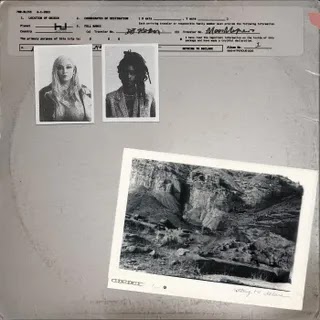On the duo’s debut full-length, DJ Haram’s East Coast club influences meet Moor Mother’s shape-shifting wordplay. It’s a noisy, thrillingly confrontational album.
Some of the fiercest political art of the past year can be found in club music. Whether via Loraine James’ cerebral musings, aya’s chaotic outbursts, or Charlotte Adigéry and Bolis Pupul’s satirical takedowns, the dancefloor has pulled double weight as a platform to air grievances about governmental neglect, societal dysfunction, and police violence. 700 Bliss, the duo of Philadelphia experimental poet/rapper Moor Mother and New Jersey-born DJ Haram, join the fight on their debut album, marshaling twisted club sounds in a spirited counterattack on the patriarchal powers that be.
The pair’s debut EP, 2018’s Spa 700, stripped East Coast club music down to a gray husk perfectly suited for Moor Mother’s gloomy, off-kilter raps. On Nothing to Declare, DJ Haram challenges Moor Mother with more biting beats, and the rapper responds with a looseness that’s new to her music. Her prophetic delivery retains all its spoken-word eloquence, and she peppers her lyrics with incisive history lessons that highlight America and Europe’s historical pillaging of Black culture. The music is anchored by a mix of frenetic goblet drums and machine percussion, swollen bass, and gristly streaks of noise. There’s hardly a line on the album where the voice isn’t processed or re-pitched, and the result is a hall-of-mirrors twisting of the two musicians’ personalities.
The beginning of Nothing to Declare is the most accessible, if only because other genres are briefly welcomed to the table. They allude to R&B on “Nightflame,” sliding Orion Sun’s chorus in between fast-rolling kicks and Moor Mother’s casual wordplay (“Ima read, newsroom/Pussy good, perfume/Ima teach, classroom/Ima walk, ballroom”). Elsewhere, “Anthology” lays a tapestry of African and Caribbean dance over an aggro techno stomp, and pays tribute to pioneering figure Katherine Dunham, the choreographer and anthropologist who introduced Afro-diasporic influences to American dance.
Two skits section the album into thirds. “Easyjet” is a make-believe bitching session about 700 Bliss that drips with fake sarcasm (“Literally, who wants to hear that shit?”), while “Spirit Airlines” is a big-chested retort that speaks to a level of confrontation seen throughout the record. Throughout, Nothing to Declare hums with an electric paranoia that rustles under the covers like a bedroom monster. Do a double-take and you’ll see it everywhere—in the high-pitched keys of “Discipline” that mimic John Williams’ Jaws theme; the muffled drums of “Sixteen” that blast like gunfire; the slugged-out drum kicks that step like Godzilla over “Bless Grips.”
Over the course of the album, they gradually abandon rigid club beats in favor of noisy abstraction. “More Victories” opens with an abrasive bleating noise that turns the atmosphere claustrophobic, leaving only the tiniest pockets of air for barely decipherable lyrics, pin-prick clicks, and scratchy vocal manipulations. The song represents the album’s noisiest extreme, but other moments are more furious in their political expression. “Candace Parker,” named after the WNBA great and featuring Palestinian artist Muqata’a, is extremely timely, given a recent Supreme Court draft opinion suggesting that Roe v. Wade might soon be overturned. “They rape our mothers while y’all just record,” Moor Mother grunts as grainy breakbeats swarm around her energizing scorn. Meanwhile, “Capitol” summons uneasy memories of the January 6th Capitol attack. Over a sparse barrage of sirens that keeps the listener in a perpetual state of alert, Moor Mother performs the last verse with a preacher’s cadence, recounting the event in the national context as “a call for arms against itself/In the selling of humanity, one war at a time.”
In order to fit her indignant raps into DJ Haram’s blasted, bass-heavy productions, Moor Mother has written with more impactful concision than ever. The best poetry on the record comes on “Crown,” in which one cutting line speaks to the damaging effect of political inaction: “A silence is killing us.” Perhaps this is where that air of paranoia comes from; their response is a chilling noise, a din meant to re-balance the current power dynamics of the world. Further in the same song, Moor Mother scratches off a hidden second part of the album’s title: “I have nothing to claim/But everything to break.” What’s left behind is a righteous wreckage, from which a new world is waiting to emerge.



0 comments:
Post a Comment